Nursing Care Report: Personal Hygiene, Communication, and Dignity
VerifiedAdded on 2020/12/29
|7
|1768
|401
Report
AI Summary
This report examines the core principles of nursing care, focusing on personal hygiene, effective communication, and upholding dignity and respect within healthcare settings. It references guidelines from the NHS, Age UK, and NICE, and provides insights into the practical application of these principles through a student nurse's experience with a 65-year-old patient with Dementia. The report highlights the importance of cleanliness, infection control, and patient-centered care, emphasizing the need for healthcare providers to maintain confidentiality and build trust with service users. It also discusses the implications of professional values, such as honesty, integrity, and compassion, in ensuring effective care practices, particularly for vulnerable patients. The report concludes by emphasizing the importance of patient consent, clear communication, and adapting care to individual needs, as outlined in the Nursing and Midwifery Code of Practice. This document is available on Desklib, a platform that provides students with AI-based study tools and resources, including past papers and solved assignments.
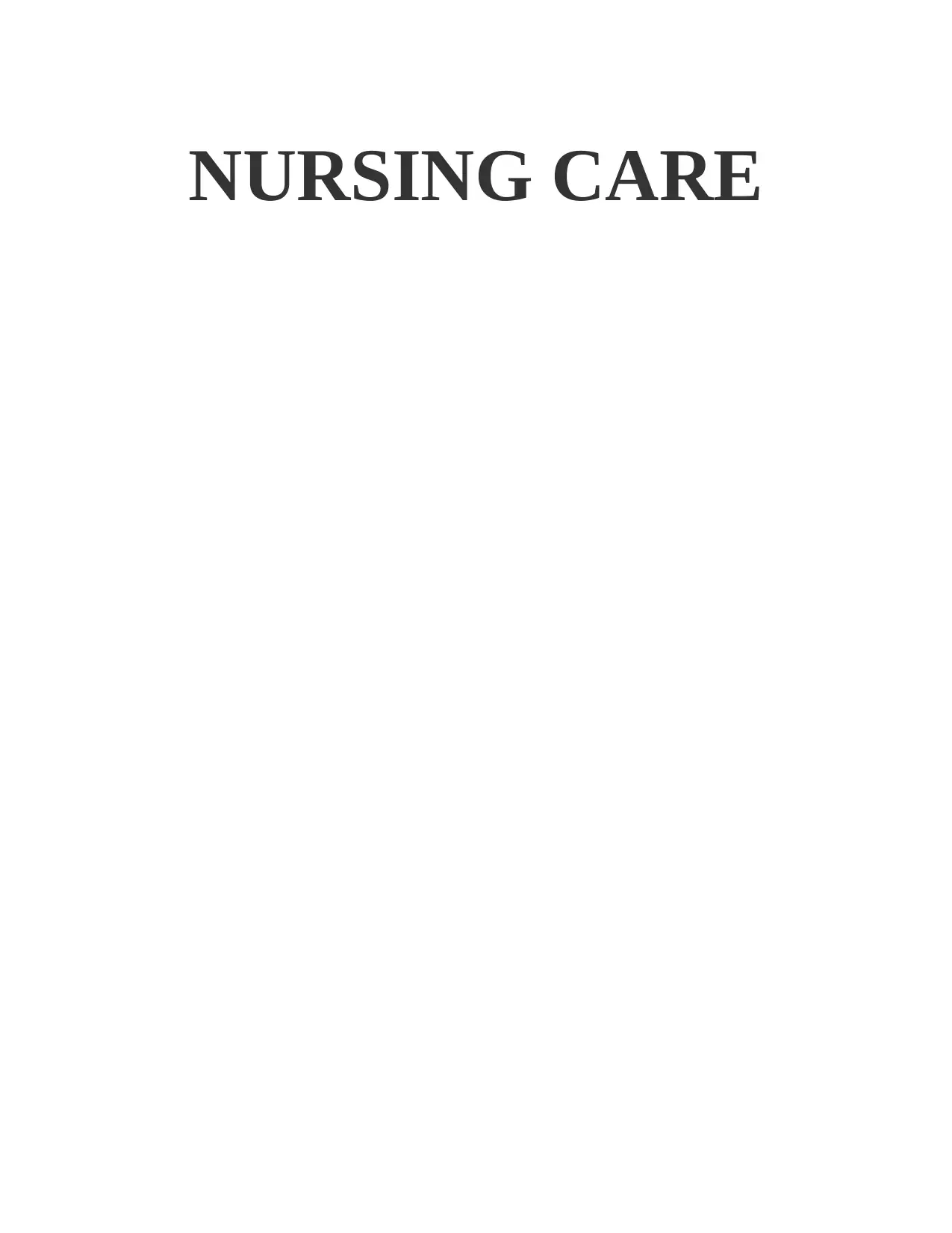
NURSING CARE
Paraphrase This Document
Need a fresh take? Get an instant paraphrase of this document with our AI Paraphraser
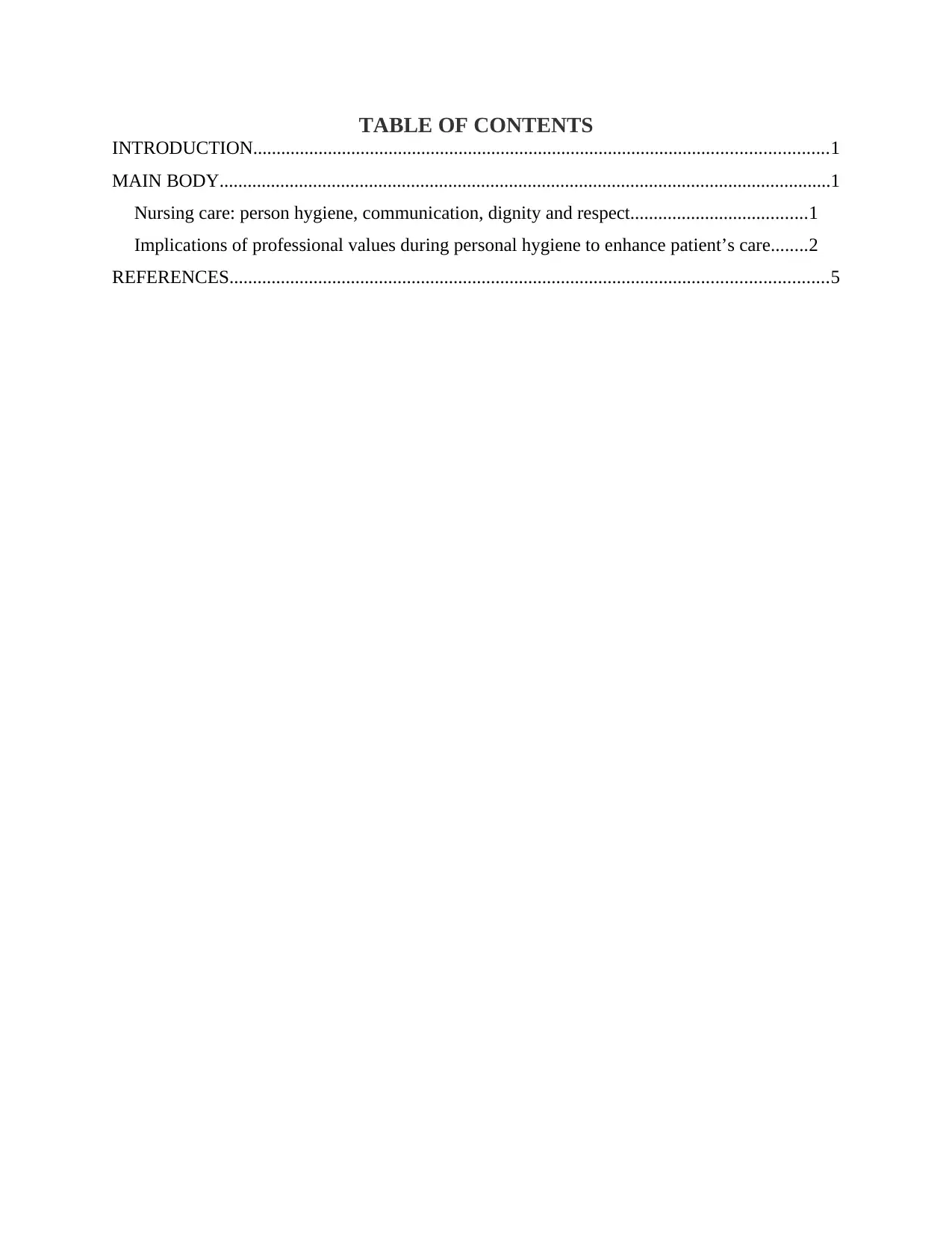
TABLE OF CONTENTS
INTRODUCTION...........................................................................................................................1
MAIN BODY...................................................................................................................................1
Nursing care: person hygiene, communication, dignity and respect......................................1
Implications of professional values during personal hygiene to enhance patient’s care........2
REFERENCES................................................................................................................................5
INTRODUCTION...........................................................................................................................1
MAIN BODY...................................................................................................................................1
Nursing care: person hygiene, communication, dignity and respect......................................1
Implications of professional values during personal hygiene to enhance patient’s care........2
REFERENCES................................................................................................................................5
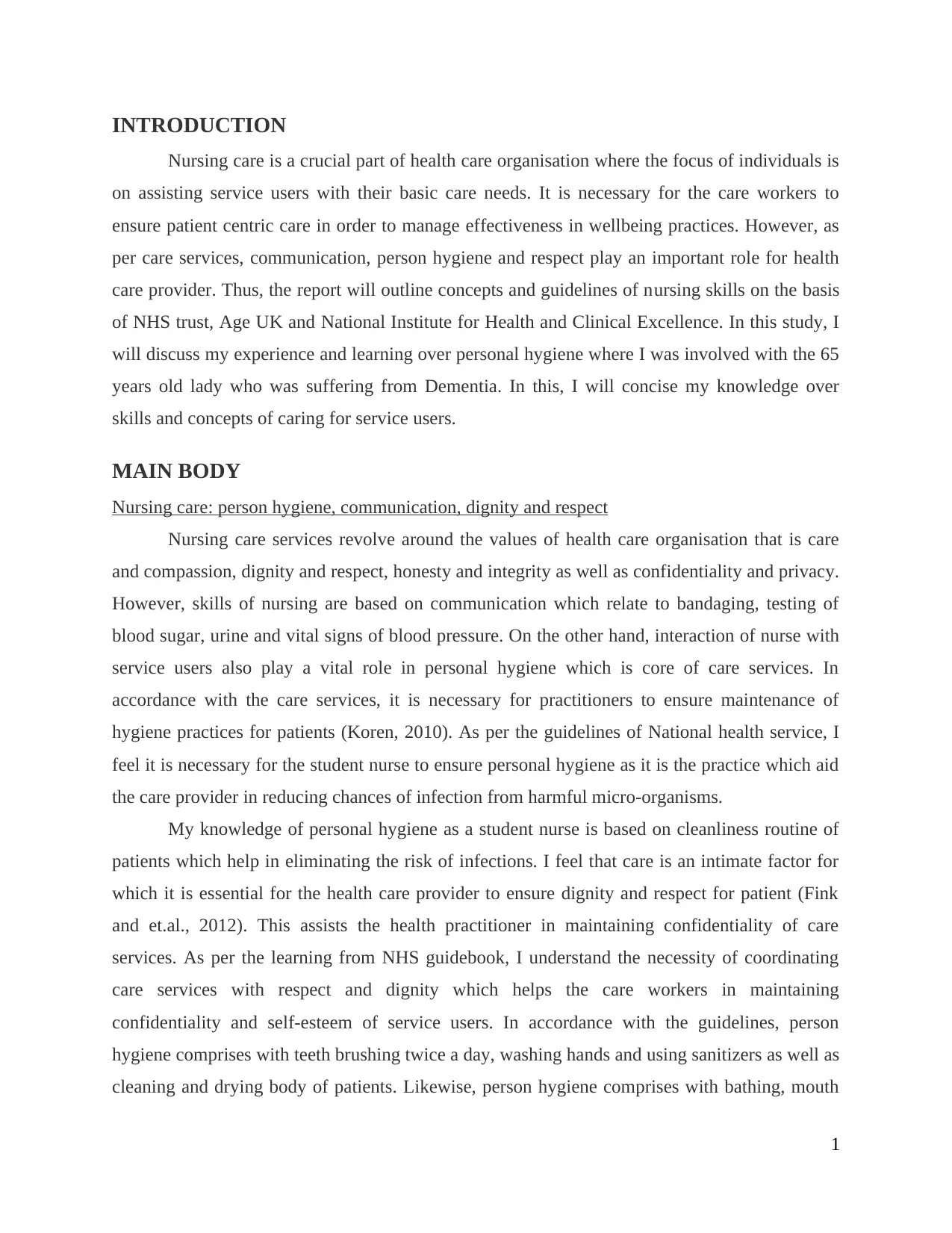
INTRODUCTION
Nursing care is a crucial part of health care organisation where the focus of individuals is
on assisting service users with their basic care needs. It is necessary for the care workers to
ensure patient centric care in order to manage effectiveness in wellbeing practices. However, as
per care services, communication, person hygiene and respect play an important role for health
care provider. Thus, the report will outline concepts and guidelines of nursing skills on the basis
of NHS trust, Age UK and National Institute for Health and Clinical Excellence. In this study, I
will discuss my experience and learning over personal hygiene where I was involved with the 65
years old lady who was suffering from Dementia. In this, I will concise my knowledge over
skills and concepts of caring for service users.
MAIN BODY
Nursing care: person hygiene, communication, dignity and respect
Nursing care services revolve around the values of health care organisation that is care
and compassion, dignity and respect, honesty and integrity as well as confidentiality and privacy.
However, skills of nursing are based on communication which relate to bandaging, testing of
blood sugar, urine and vital signs of blood pressure. On the other hand, interaction of nurse with
service users also play a vital role in personal hygiene which is core of care services. In
accordance with the care services, it is necessary for practitioners to ensure maintenance of
hygiene practices for patients (Koren, 2010). As per the guidelines of National health service, I
feel it is necessary for the student nurse to ensure personal hygiene as it is the practice which aid
the care provider in reducing chances of infection from harmful micro-organisms.
My knowledge of personal hygiene as a student nurse is based on cleanliness routine of
patients which help in eliminating the risk of infections. I feel that care is an intimate factor for
which it is essential for the health care provider to ensure dignity and respect for patient (Fink
and et.al., 2012). This assists the health practitioner in maintaining confidentiality of care
services. As per the learning from NHS guidebook, I understand the necessity of coordinating
care services with respect and dignity which helps the care workers in maintaining
confidentiality and self-esteem of service users. In accordance with the guidelines, person
hygiene comprises with teeth brushing twice a day, washing hands and using sanitizers as well as
cleaning and drying body of patients. Likewise, person hygiene comprises with bathing, mouth
1
Nursing care is a crucial part of health care organisation where the focus of individuals is
on assisting service users with their basic care needs. It is necessary for the care workers to
ensure patient centric care in order to manage effectiveness in wellbeing practices. However, as
per care services, communication, person hygiene and respect play an important role for health
care provider. Thus, the report will outline concepts and guidelines of nursing skills on the basis
of NHS trust, Age UK and National Institute for Health and Clinical Excellence. In this study, I
will discuss my experience and learning over personal hygiene where I was involved with the 65
years old lady who was suffering from Dementia. In this, I will concise my knowledge over
skills and concepts of caring for service users.
MAIN BODY
Nursing care: person hygiene, communication, dignity and respect
Nursing care services revolve around the values of health care organisation that is care
and compassion, dignity and respect, honesty and integrity as well as confidentiality and privacy.
However, skills of nursing are based on communication which relate to bandaging, testing of
blood sugar, urine and vital signs of blood pressure. On the other hand, interaction of nurse with
service users also play a vital role in personal hygiene which is core of care services. In
accordance with the care services, it is necessary for practitioners to ensure maintenance of
hygiene practices for patients (Koren, 2010). As per the guidelines of National health service, I
feel it is necessary for the student nurse to ensure personal hygiene as it is the practice which aid
the care provider in reducing chances of infection from harmful micro-organisms.
My knowledge of personal hygiene as a student nurse is based on cleanliness routine of
patients which help in eliminating the risk of infections. I feel that care is an intimate factor for
which it is essential for the health care provider to ensure dignity and respect for patient (Fink
and et.al., 2012). This assists the health practitioner in maintaining confidentiality of care
services. As per the learning from NHS guidebook, I understand the necessity of coordinating
care services with respect and dignity which helps the care workers in maintaining
confidentiality and self-esteem of service users. In accordance with the guidelines, person
hygiene comprises with teeth brushing twice a day, washing hands and using sanitizers as well as
cleaning and drying body of patients. Likewise, person hygiene comprises with bathing, mouth
1
⊘ This is a preview!⊘
Do you want full access?
Subscribe today to unlock all pages.

Trusted by 1+ million students worldwide
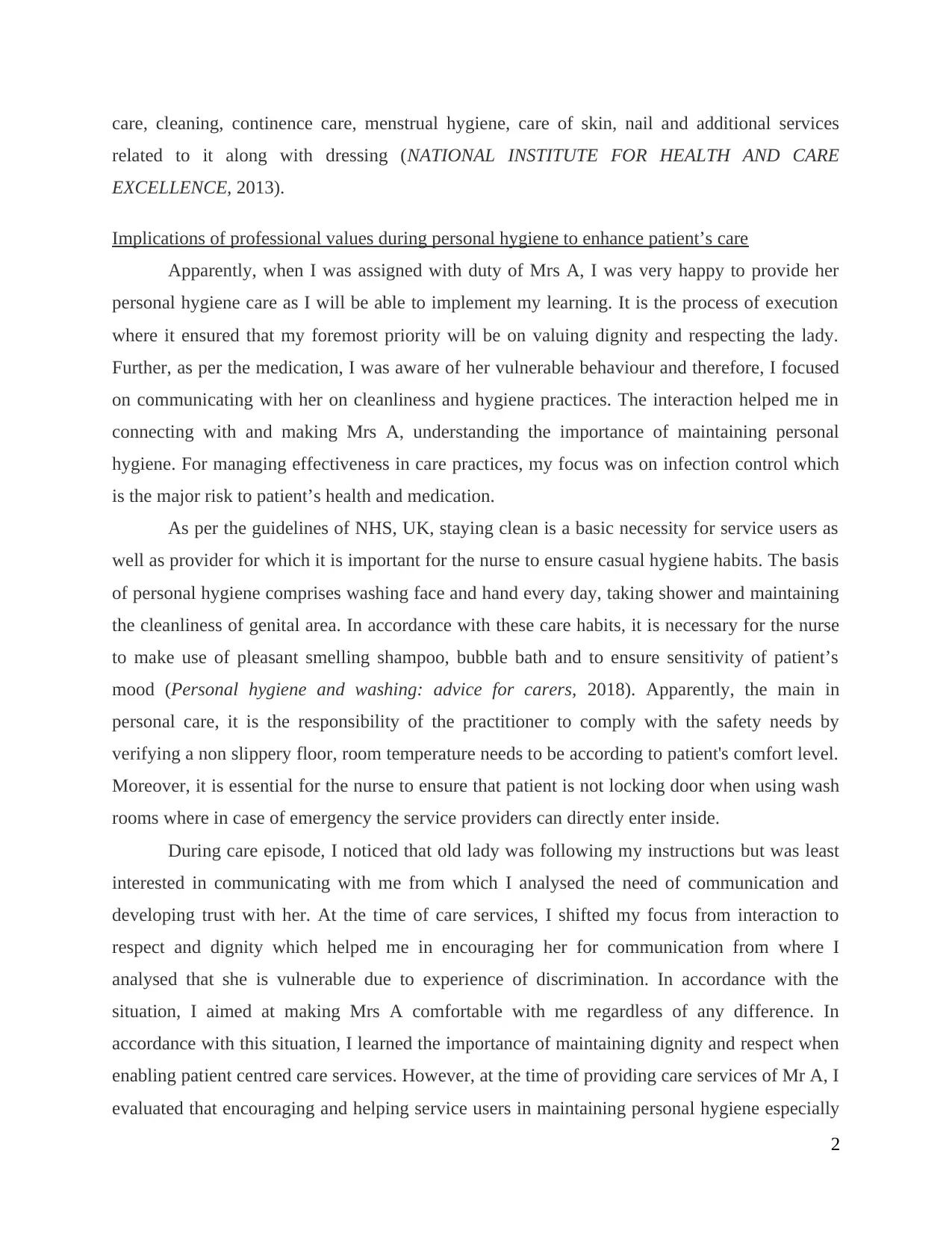
care, cleaning, continence care, menstrual hygiene, care of skin, nail and additional services
related to it along with dressing (NATIONAL INSTITUTE FOR HEALTH AND CARE
EXCELLENCE, 2013).
Implications of professional values during personal hygiene to enhance patient’s care
Apparently, when I was assigned with duty of Mrs A, I was very happy to provide her
personal hygiene care as I will be able to implement my learning. It is the process of execution
where it ensured that my foremost priority will be on valuing dignity and respecting the lady.
Further, as per the medication, I was aware of her vulnerable behaviour and therefore, I focused
on communicating with her on cleanliness and hygiene practices. The interaction helped me in
connecting with and making Mrs A, understanding the importance of maintaining personal
hygiene. For managing effectiveness in care practices, my focus was on infection control which
is the major risk to patient’s health and medication.
As per the guidelines of NHS, UK, staying clean is a basic necessity for service users as
well as provider for which it is important for the nurse to ensure casual hygiene habits. The basis
of personal hygiene comprises washing face and hand every day, taking shower and maintaining
the cleanliness of genital area. In accordance with these care habits, it is necessary for the nurse
to make use of pleasant smelling shampoo, bubble bath and to ensure sensitivity of patient’s
mood (Personal hygiene and washing: advice for carers, 2018). Apparently, the main in
personal care, it is the responsibility of the practitioner to comply with the safety needs by
verifying a non slippery floor, room temperature needs to be according to patient's comfort level.
Moreover, it is essential for the nurse to ensure that patient is not locking door when using wash
rooms where in case of emergency the service providers can directly enter inside.
During care episode, I noticed that old lady was following my instructions but was least
interested in communicating with me from which I analysed the need of communication and
developing trust with her. At the time of care services, I shifted my focus from interaction to
respect and dignity which helped me in encouraging her for communication from where I
analysed that she is vulnerable due to experience of discrimination. In accordance with the
situation, I aimed at making Mrs A comfortable with me regardless of any difference. In
accordance with this situation, I learned the importance of maintaining dignity and respect when
enabling patient centred care services. However, at the time of providing care services of Mr A, I
evaluated that encouraging and helping service users in maintaining personal hygiene especially
2
related to it along with dressing (NATIONAL INSTITUTE FOR HEALTH AND CARE
EXCELLENCE, 2013).
Implications of professional values during personal hygiene to enhance patient’s care
Apparently, when I was assigned with duty of Mrs A, I was very happy to provide her
personal hygiene care as I will be able to implement my learning. It is the process of execution
where it ensured that my foremost priority will be on valuing dignity and respecting the lady.
Further, as per the medication, I was aware of her vulnerable behaviour and therefore, I focused
on communicating with her on cleanliness and hygiene practices. The interaction helped me in
connecting with and making Mrs A, understanding the importance of maintaining personal
hygiene. For managing effectiveness in care practices, my focus was on infection control which
is the major risk to patient’s health and medication.
As per the guidelines of NHS, UK, staying clean is a basic necessity for service users as
well as provider for which it is important for the nurse to ensure casual hygiene habits. The basis
of personal hygiene comprises washing face and hand every day, taking shower and maintaining
the cleanliness of genital area. In accordance with these care habits, it is necessary for the nurse
to make use of pleasant smelling shampoo, bubble bath and to ensure sensitivity of patient’s
mood (Personal hygiene and washing: advice for carers, 2018). Apparently, the main in
personal care, it is the responsibility of the practitioner to comply with the safety needs by
verifying a non slippery floor, room temperature needs to be according to patient's comfort level.
Moreover, it is essential for the nurse to ensure that patient is not locking door when using wash
rooms where in case of emergency the service providers can directly enter inside.
During care episode, I noticed that old lady was following my instructions but was least
interested in communicating with me from which I analysed the need of communication and
developing trust with her. At the time of care services, I shifted my focus from interaction to
respect and dignity which helped me in encouraging her for communication from where I
analysed that she is vulnerable due to experience of discrimination. In accordance with the
situation, I aimed at making Mrs A comfortable with me regardless of any difference. In
accordance with this situation, I learned the importance of maintaining dignity and respect when
enabling patient centred care services. However, at the time of providing care services of Mr A, I
evaluated that encouraging and helping service users in maintaining personal hygiene especially
2
Paraphrase This Document
Need a fresh take? Get an instant paraphrase of this document with our AI Paraphraser
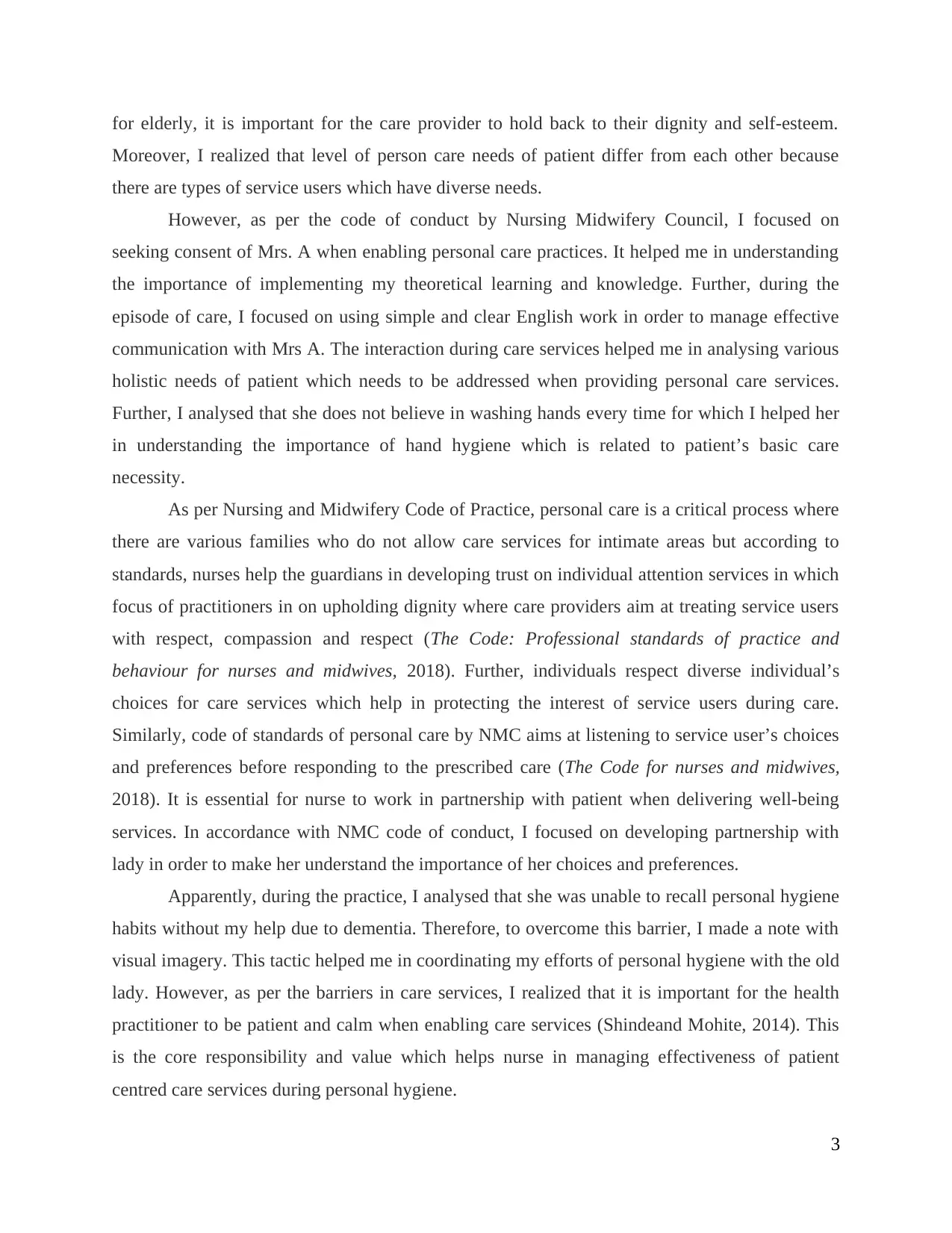
for elderly, it is important for the care provider to hold back to their dignity and self-esteem.
Moreover, I realized that level of person care needs of patient differ from each other because
there are types of service users which have diverse needs.
However, as per the code of conduct by Nursing Midwifery Council, I focused on
seeking consent of Mrs. A when enabling personal care practices. It helped me in understanding
the importance of implementing my theoretical learning and knowledge. Further, during the
episode of care, I focused on using simple and clear English work in order to manage effective
communication with Mrs A. The interaction during care services helped me in analysing various
holistic needs of patient which needs to be addressed when providing personal care services.
Further, I analysed that she does not believe in washing hands every time for which I helped her
in understanding the importance of hand hygiene which is related to patient’s basic care
necessity.
As per Nursing and Midwifery Code of Practice, personal care is a critical process where
there are various families who do not allow care services for intimate areas but according to
standards, nurses help the guardians in developing trust on individual attention services in which
focus of practitioners in on upholding dignity where care providers aim at treating service users
with respect, compassion and respect (The Code: Professional standards of practice and
behaviour for nurses and midwives, 2018). Further, individuals respect diverse individual’s
choices for care services which help in protecting the interest of service users during care.
Similarly, code of standards of personal care by NMC aims at listening to service user’s choices
and preferences before responding to the prescribed care (The Code for nurses and midwives,
2018). It is essential for nurse to work in partnership with patient when delivering well-being
services. In accordance with NMC code of conduct, I focused on developing partnership with
lady in order to make her understand the importance of her choices and preferences.
Apparently, during the practice, I analysed that she was unable to recall personal hygiene
habits without my help due to dementia. Therefore, to overcome this barrier, I made a note with
visual imagery. This tactic helped me in coordinating my efforts of personal hygiene with the old
lady. However, as per the barriers in care services, I realized that it is important for the health
practitioner to be patient and calm when enabling care services (Shindeand Mohite, 2014). This
is the core responsibility and value which helps nurse in managing effectiveness of patient
centred care services during personal hygiene.
3
Moreover, I realized that level of person care needs of patient differ from each other because
there are types of service users which have diverse needs.
However, as per the code of conduct by Nursing Midwifery Council, I focused on
seeking consent of Mrs. A when enabling personal care practices. It helped me in understanding
the importance of implementing my theoretical learning and knowledge. Further, during the
episode of care, I focused on using simple and clear English work in order to manage effective
communication with Mrs A. The interaction during care services helped me in analysing various
holistic needs of patient which needs to be addressed when providing personal care services.
Further, I analysed that she does not believe in washing hands every time for which I helped her
in understanding the importance of hand hygiene which is related to patient’s basic care
necessity.
As per Nursing and Midwifery Code of Practice, personal care is a critical process where
there are various families who do not allow care services for intimate areas but according to
standards, nurses help the guardians in developing trust on individual attention services in which
focus of practitioners in on upholding dignity where care providers aim at treating service users
with respect, compassion and respect (The Code: Professional standards of practice and
behaviour for nurses and midwives, 2018). Further, individuals respect diverse individual’s
choices for care services which help in protecting the interest of service users during care.
Similarly, code of standards of personal care by NMC aims at listening to service user’s choices
and preferences before responding to the prescribed care (The Code for nurses and midwives,
2018). It is essential for nurse to work in partnership with patient when delivering well-being
services. In accordance with NMC code of conduct, I focused on developing partnership with
lady in order to make her understand the importance of her choices and preferences.
Apparently, during the practice, I analysed that she was unable to recall personal hygiene
habits without my help due to dementia. Therefore, to overcome this barrier, I made a note with
visual imagery. This tactic helped me in coordinating my efforts of personal hygiene with the old
lady. However, as per the barriers in care services, I realized that it is important for the health
practitioner to be patient and calm when enabling care services (Shindeand Mohite, 2014). This
is the core responsibility and value which helps nurse in managing effectiveness of patient
centred care services during personal hygiene.
3

4
⊘ This is a preview!⊘
Do you want full access?
Subscribe today to unlock all pages.

Trusted by 1+ million students worldwide
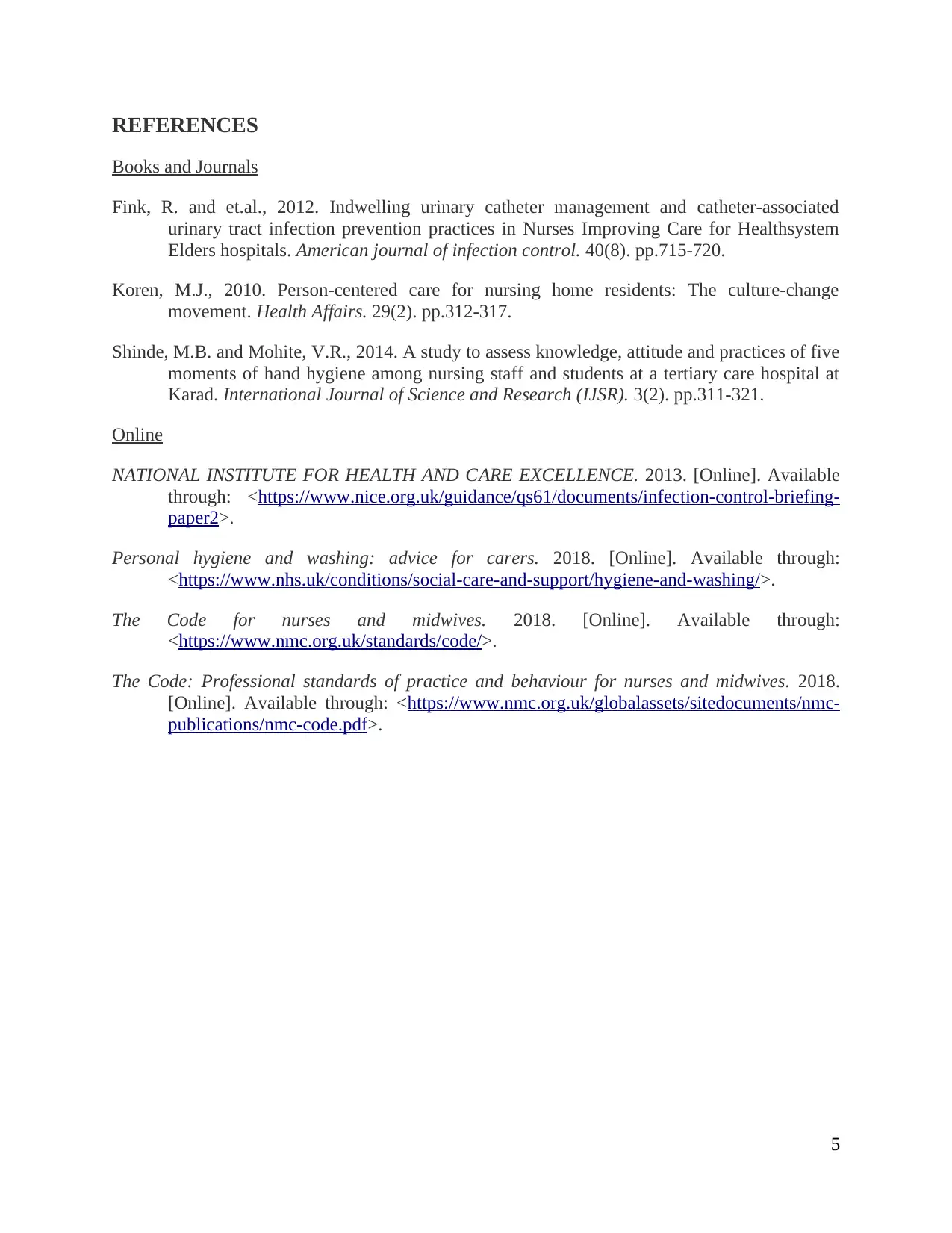
REFERENCES
Books and Journals
Fink, R. and et.al., 2012. Indwelling urinary catheter management and catheter-associated
urinary tract infection prevention practices in Nurses Improving Care for Healthsystem
Elders hospitals. American journal of infection control. 40(8). pp.715-720.
Koren, M.J., 2010. Person-centered care for nursing home residents: The culture-change
movement. Health Affairs. 29(2). pp.312-317.
Shinde, M.B. and Mohite, V.R., 2014. A study to assess knowledge, attitude and practices of five
moments of hand hygiene among nursing staff and students at a tertiary care hospital at
Karad. International Journal of Science and Research (IJSR). 3(2). pp.311-321.
Online
NATIONAL INSTITUTE FOR HEALTH AND CARE EXCELLENCE. 2013. [Online]. Available
through: <https://www.nice.org.uk/guidance/qs61/documents/infection-control-briefing-
paper2>.
Personal hygiene and washing: advice for carers. 2018. [Online]. Available through:
<https://www.nhs.uk/conditions/social-care-and-support/hygiene-and-washing/>.
The Code for nurses and midwives. 2018. [Online]. Available through:
<https://www.nmc.org.uk/standards/code/>.
The Code: Professional standards of practice and behaviour for nurses and midwives. 2018.
[Online]. Available through: <https://www.nmc.org.uk/globalassets/sitedocuments/nmc-
publications/nmc-code.pdf>.
5
Books and Journals
Fink, R. and et.al., 2012. Indwelling urinary catheter management and catheter-associated
urinary tract infection prevention practices in Nurses Improving Care for Healthsystem
Elders hospitals. American journal of infection control. 40(8). pp.715-720.
Koren, M.J., 2010. Person-centered care for nursing home residents: The culture-change
movement. Health Affairs. 29(2). pp.312-317.
Shinde, M.B. and Mohite, V.R., 2014. A study to assess knowledge, attitude and practices of five
moments of hand hygiene among nursing staff and students at a tertiary care hospital at
Karad. International Journal of Science and Research (IJSR). 3(2). pp.311-321.
Online
NATIONAL INSTITUTE FOR HEALTH AND CARE EXCELLENCE. 2013. [Online]. Available
through: <https://www.nice.org.uk/guidance/qs61/documents/infection-control-briefing-
paper2>.
Personal hygiene and washing: advice for carers. 2018. [Online]. Available through:
<https://www.nhs.uk/conditions/social-care-and-support/hygiene-and-washing/>.
The Code for nurses and midwives. 2018. [Online]. Available through:
<https://www.nmc.org.uk/standards/code/>.
The Code: Professional standards of practice and behaviour for nurses and midwives. 2018.
[Online]. Available through: <https://www.nmc.org.uk/globalassets/sitedocuments/nmc-
publications/nmc-code.pdf>.
5
1 out of 7
Related Documents
Your All-in-One AI-Powered Toolkit for Academic Success.
+13062052269
info@desklib.com
Available 24*7 on WhatsApp / Email
![[object Object]](/_next/static/media/star-bottom.7253800d.svg)
Unlock your academic potential
Copyright © 2020–2026 A2Z Services. All Rights Reserved. Developed and managed by ZUCOL.





